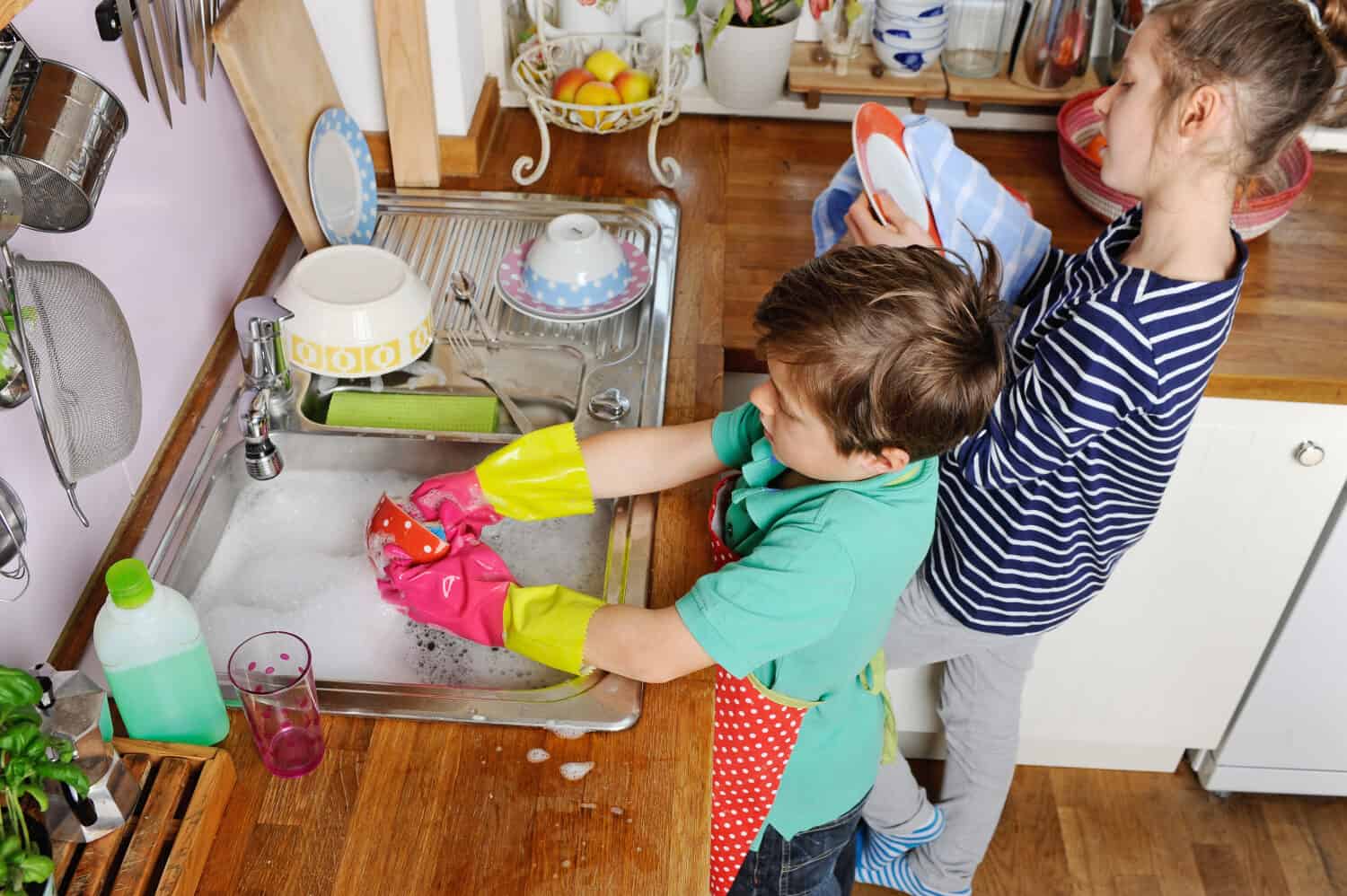As new generations come to the forefront of our society, a shift in values and approaches begins to ensue. One area that has seen such a shift is the world of parenting. Each generation has its idea of the best practices when raising children. However, two generations that seem to differ in their approaches are the baby boomers and the millennials. While some of the core values may be similar between the two generations, recent studies and findings show that they greatly differ in their methods of instilling those values. In this article, we will discuss parenting techniques that boomers swear by that millennials would never use. Then, we will compare the two. It will provide an overview of the two parenting styles and allow you to compare boomer vs. millennial parenting techniques. Let’s dive in!
Baby Boomer vs. Millennial: What Is the Difference?

©fizkes/Shutterstock.com
Before you analyze the difference between these two groups’ parenting techniques, you should first understand what each group is. Each of these groups is a different generation. A generation is a group of individuals born around the same time that usually see the world similarly.
The baby boomers, also known as boomers, were born between the years of 1946-1964. This generation received this name because of the influx in birth rates during the time post World War II. Baby boomers tend to be associated with high work ethics, independence, very career-focused, and competitive nature. They also played a large role in social change through activism during the sixties.
Millennials, often the children of baby boomers, were born between 1981 and 1996. This generation is the first to grow up with the internet and has been called the global generation. They are also sometimes referred to as the “Unluckiest Generation”. This is due to the shared experience of slower economic growth. More so than many other generations. Millennials are known to be quick to understand technology and tend to postpone marriage and children until later in life. This generation tends to place higher values on achievement, trust, authenticity, transparency, meaningful work, diversity, and mental health prioritization.
Boomer vs. Millennial Parenting Techniques
While both generations have pros and cons of their parenting styles, the general outline of each style is this. Boomers tend to prioritize respecting authority figures, placing a high value on education, having clear distinctions between parent and child in their relationships, and having a solid structure. Meanwhile, millennials tend to prioritize emotional connection with their children, open communication, positive reinforcement, and encouraging autonomy in their children.
Below are 10 parenting techniques that people in the baby boomer generation commonly use. These are tactics and techniques that members of this generation swear by when raising children. However, although boomers swear by these techniques, you would not see an average millennial using them. Below we compare boomer vs. millennial parenting techniques.
1. Helicopter Parenting
The term helicopter parenting was given to the boomer generation in the 1980s and is characterized by hovering over your child. If someone is a helicopter parent, they tend to be a bit overbearing and overprotective. While this comes from a good place and a desire to protect those you love, it can have negative consequences. According to Cleveland Clinic, “researchers found that over-controlling parenting of a child at age 2 was associated with poorer emotional and behavioral regulation at age 5.” Additionally, this authoritarian parenting style has been linked to creating dependency on others and ineffective coping skills in the children who are brought up with them.
Boomers tend to look at children today and think that they lack structure and guidance. They may express that kids have too much autonomy in their choices. Also, it is the parent’s responsibility to make decisions for their children until they reach a certain age. While many millennials agree with these points, they also favor providing their child with that autonomy. They act more as a facilitator in guiding their children to take the right approaches. Millennials are much more lax with this parenting technique. This style has been referred to as the “drone” approach. Rather than hovering and anticipating needs or outcomes, millennial parents watch their children and respond to their needs once they have occurred.
2. Strict Career Expectations

©PeopleImages.com – Yuri A/Shutterstock.com
Those in the baby boomer generation placed a higher value on education and more rigid career expectations for their children than modern-day millennials. Boomers favor stable, long-term, traditional career paths and have a very work-centric mindset around education and jobs.
This differs from millennials, who favor a work-life balance. Also, they are more open to alternative learning methods, such as online education or homeschooling. Additionally, millennial parents are more understanding of new emerging careers in the media space, such as influencers and Youtubers. Due to their growing up with technology, millennial parents are more willing to be okay with their child having a “non-traditional” career than their boomer counterparts.
3. Mandatory Familial Affection
A new parenting trend that sets millennials apart from boomers is non-mandatory familial affection. Oftentimes, as parents, boomers would encourage familial affection. If grandma or grandpa came over, children were usually met with the phrase, “Go give (fill in the person’s role or name) a hug.” Baby boomers hold traditional family roles with very high standards. It seemed like no big deal to tell their children to hug Grandma when she came over. Usually, it was an act of teaching kindness and affection.
On the other hand, millennial parents tend to look at the situation differently. While it can be tempting to encourage your child to give their family members the hugs that they are craving, millennial parents instead focus on the signs their child is giving rather than the requests their family is making. Some children are uncomfortable with hugs or large social settings, and being forced to give hugs and kisses can be unbearable for them. By allowing their child to decide who they give hugs to and when millennial parents are teaching their children an important lesson about consent.
While most people think of sexual situations when they hear the word consent, it is a skill that extends beyond those situations. You can teach your child about boundaries, how to make sure people respect them, and how to respect others' boundaries in return.
4. Time Outs
Another difference between boomer and millennial parenting techniques is the use of time-outs. Oftentimes, when a child acted out or misbehaved, it was typical for a baby boomer to send them to their room for a time-out. While time outs were meant to be a time for reflection on their poor actions, and to show that bad behavior does not encourage affection, millennials tend to opt for a different approach.
Instead of sending children to their rooms, millennial parents want to talk the issue through with their children. The goal of this interaction is to show the child that their feelings and needs are heard and understood. Then, once the child is calm, the parent and child discuss the issue more thoroughly. They then decide on a better course of action for the next time.
5. Corporal Punishment
A strong distinction between the two generations' parenting styles is the use of corporal punishment. While spanking or washing a child’s mouth out with soap may have not seemed like a big deal in the past, many millennial parents today are against all forms of corporal punishment. Instead, they use a technique that is referred to as gentle parenting.
Gentle parenting is an emotion-focused parenting technique. It relies on empathy, understanding, and mutual respect. Boomer parenting styles are more heavily focused on punishment and reward systems. Gentle parenting focuses on improving self-awareness, understanding behaviors, and setting healthy boundaries.
While many boomers scoff at the idea of gentle parenting and think that it allows the child to walk all over the parent, many millennials swear by it. Gentle parenting helps children learn to empathize and helps them become more aware of themselves. However, researchers have begun to discover that there is a correlation between gentle parenting and childhood obesity.
6. Screen Time Limitations

©NadyaEugene/Shutterstock.com
While there is more technology for children today, there was still the use of technology for the millennial generation when they were children. Most millennials are the children of boomers, and they can remember screen time limitations from their childhood. You were only allowed to play video games or watch television for a set amount of time each day. Or sometimes, only certain days a week. That is because older generations saw television or screen time as something that rotted your brain. It was something that should only be used as a treat.
Although too much screen time can indeed lead to issues such as heightened attention-deficit symptoms, social isolation, and disrupted sleep, many millennial parents see the value that it can have on their children’s education. Gone are the days when technology was just for cartoons. Now, there are so many educational resources available online for kids to enjoy. Technology is now not seen as a hindrance but as an opportunity. It provides students with easily accessible information and fun ways to learn.
7. Making Children Do Chores

©granata68/Shutterstock.com
Baby boomers had a high respect for responsibility and for following rules. Often, when these children were eight or nine years old they were making their beds, doing dishes, and helping around the house. Therefore, it is no surprise that boomers instilled those values in their children as well. Oftentimes, boomer children were given chores to teach responsibility and to learn about the idea of pulling one’s weight in the household. These roles, often gender-stereotypical, were usually things such as cleaning the dishes, setting the table, mowing the grass, helping with the laundry, taking out the trash, etc.
One of the main reasons that millennial parents tend to stray from making their children do chores is that they often do not encourage gender-stereotyping roles. In fact, according to TIME, fifty percent of millennial parents have purposefully bought gender-neutral toys for their children. In an attempt to avoid placing gender roles on their children, many younger parents may avoid giving them chores that could be seen as stereotypical. Instead, many children now are only asked to do the most trivial responsibilities, such as feeding a pet, cleaning the table, or tidying up after themselves.
8. Authoritarian Parenting Style
Authoritarian parenting was a very common style during the baby boomer era. The authoritarian parenting style is a strict style that places high expectations on the children and there is mainly a one-way dialogue. The parent sets expectations and rules, and the child obeys them. Boomers swear by this style of parenting and say that it keeps children well-behaved. While it is true that children of an authoritarian parent household are usually well-behaved and good at following instructions, they also have higher levels of aggression, are shy, and are usually unable to make their own decisions.
Millennial parents take a different approach. While many boomers would argue that millennials have adopted permissive parenting, many millennials argue that they use gentle parenting. Permissive parenting styles are the opposite of authoritarian. They are warm and nurturing and have little to no expectations of their children. They have open communication and limited rules. Parents who use this style are often seen as pushovers who give their children too much freedom. Children of this parenting style usually have decent social skills but can be impulsive and lack self-regulation.
Gentle parenting, on the other hand, is a great combination. The warmth and compassion from permissive parenting are still there but with more structure. The goal of gentle parenting is to make an active effort to understand your child’s feelings and ways of thinking, while still maintaining boundaries and ensuring there is respect. This parenting style is much more common in generations today.
9. Clean Your Plate Mentality

©Daniel Jedzura/Shutterstock.com
The mentality of you must “clean” your dinner plate, meaning eat everything on it in its entirety, was a notion that was taught to boomers when they were children. World War II ended in 1945, the first year of the boomer generation was 1946, so the effects of the war were still being felt when the boomers were children. Many food items were scarce or harder to come by during those times, so the idea of eating everything on your plate so you didn’t waste made sense.
However, boomers took that teaching from their parents and carried it down to their children many years later. While not wasting is a good thing, forcing a child to eat everything on their plate can have damaging effects on the child and their relationship with food. In fact, certain experts say that engaging in the “clean plate” mentality can lead to overconsumption and even spark eating disorders.
Millennial parents tend to be more lenient with their children when it comes to food and food choices. They encourage their children to try everything on their plate, but if they do not like something they are not forced to eat it. The focus here is more on allowing children to experiment with foods and learn what they like while fostering healthy eating habits and a healthy relationship with food.
10. Closed Dialogue Parenting
Another parenting style that differs from boomers and millennials is the dialogue that they have with their children. Baby boomers tend to favor a closed-dialogue parenting style. With this style, parents withhold information from their children that they deem too sensitive, inappropriate, or complex. Some of those topics could include sexuality, gender, societal issues, or mental health.
Millennial parents are much more open with their dialogue with their children. They seek a much more intimate relationship with their children and try to teach them through the mistakes that they have made in their lives. With this dialogue style, parents make their children an active part of the house discussions and decisions. In a poll, 74 percent of millennial parents said they involve children in household decisions. Additionally, 8 out of 10 millennial parents claim that their child is one of their best friends.
Summary of Boomer vs. Millennial Parenting Techniques
| Parenting Technique | Boomer Approach | Millennial Approach |
|---|---|---|
| Helicopter Parenting | Tend to be over-protective and hover over their child, anticipating their needs. | Are often more laid back and respond to their child's needs when they arise. |
| Career Expectations | Place a high value on education and have strict career expectations, favoring traditional career paths. | Value education but are open to alternative learning methods and career paths. |
| Familial Affection | Often encouraged or mandated familial affection in an attempt to teach kindness and affection. | Many millennials allow their children to decide who they show affection to and when. |
| Time Outs | Boomers use time-outs as a punishment for bad behavior. It is a time for reflection and lessons. | Millennials prefer to talk through issues with their children, understand their feelings, and discover better ways to handle them. |
| Corporal Punishment | This generation often used corporal punishment such as spanking or washing the mouth with soap to teach lessons. | This generation focuses more on gentle parenting. An emotion-based technique that relies on empathy, understanding, and mutual respect. |
| Screen Time | Usually placed limitations on it, was seen as something that was only used for a treat. | Less strict with limitations and sees the educational value in it as well. |
| Chores | Often had their children help around the home to teach respect and responsibility. | Tend to stray away from gender-stereotypical roles or chores and instead have children do the most trivial responsibilities. |
| Parenting Style | Boomers tended to favor an authoritarian parenting style. | Millennials tend to favor a gentle parenting style. |
| Food | Were raised with the “clean plate” mentality where you had to finish every morsel on your plate so you were not wasting food. | Prefer to be more lenient with food choices. Encourage children to try all foods but do not force the consumption of them. |
| Dialogue | This generation usually had a closed-dialogue style with their children. Avoiding sensitive or complex topics. | This generation has an open dialogue with their children, seeking a much more intimate, almost friend-like, relationship with their child. |
Which Parenting Technique Is Better?
When it comes to which parenting technique is better, it is up to the parents' personal preference. You have to select the style, or blend of styles that feels the best to you and makes the most sense for your family. There are strengths and weaknesses to each approach. Boomers foster a great sense of responsibility and respect in their children, whereas millennials foster close emotional connection, self-expression, and autonomy in theirs. Becoming well-informed about each parenting style, and making it applicable to your family is the best course of action.
The image featured at the top of this post is ©fizkes/Shutterstock.com.